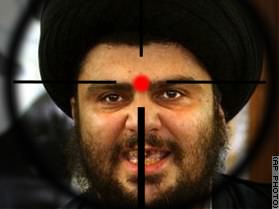

Background note:
************************EXCERPT***********************
By NIBRAS KAZIMI May 9, 2008
Ever since the prime minister of Iraq, Nouri al-Maliki, launched Operation Cavalry Charge in Basra on March 25, which has been going on there and elsewhere across Iraq, three important conclusions can be drawn: the Iraqi state and the Iraqi army can function on their own; an influential figure in Iraq, Muqtada al-Sadr, is much weaker than he was deemed to be; and Iran has bet on the wrong horse.
As a result of being unable to rely on Mr. Sadr’s organization, Iran would lose a menacing avenue for retaliation against America should Iran’s illicit nuclear program get attacked.
Basra had a moment of clarity, illuminating the convergence of several positive trends in Iraq. What’s driving these trends is a sense among regular Iraqis that their state has outlasted its challengers, whether they are Sunni insurgents, organized crime cartels, or hostile regional powers. Basra is “Exhibit A” for those who argue that Iraq’s remaining problems are fixable, that the achievements seen so far are irreversible, and that a sense of patriotic cohesion is salvageable and viable.
Consequently, the events in Basra do not sit well with those who have argued otherwise and staked their careers and credibility to the storyline that Iraq is irredeemable, such as the many journalists and pundits who have been covering Iraq over the last five years. This has seemingly induced them to fabricate a negative and false narrative in the hope that their predictions would go unchallenged.
Six weeks ago, Iraqi policemen in Basra were dodging RPG projectiles fired by teenagers. These days, though, they keep themselves busy with house-to-house sweeps in search for weapons caches. Moreover, on a daily basis, they issue hundreds of tickets for traffic and parking violations. Indeed, the situation in Basra has changed dramatically.
The violence in Basra was not sectarian in nature even though Iraq’s southernmost province — first in potential wealth with between 60% and 70% of the country’s oil and second, after Baghdad, in its population size — boasts a significant Sunni minority, as well as Christian, Mandean, and non-mainstream Shia denominations.
Basra’s chaos resulted from a unique mélange of Iranian meddling, proliferation of organized crime, and Britain’s unsteady hand in running military and political matters. The Americans had delegated Basra’s management to their British allies, who ended up ruining things in Iraq’s most promising piece of real estate.